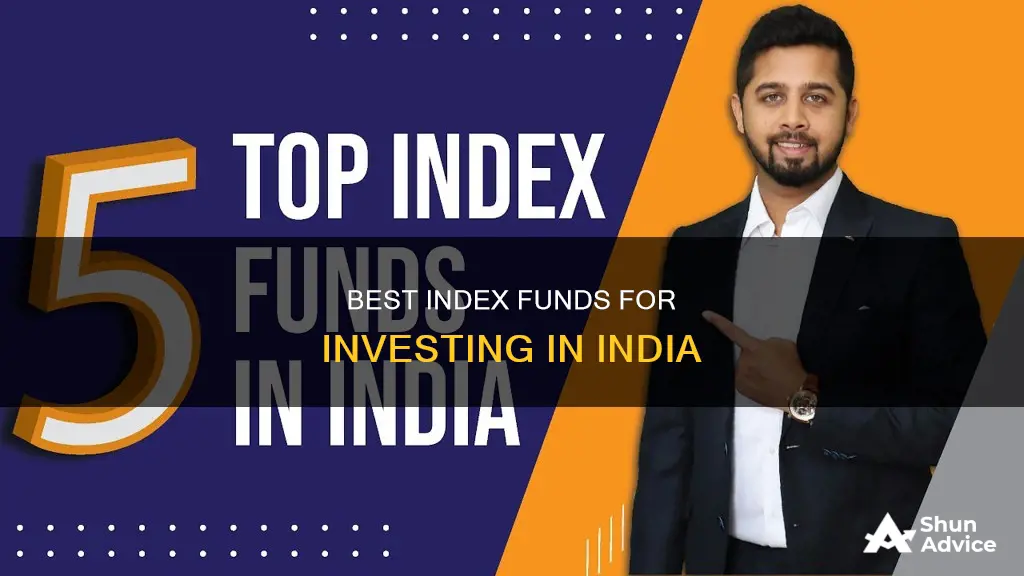
Index funds are a type of passively managed mutual fund or exchange-traded fund (ETF) that attempts to replicate the performance of a specific market index, such as the Nifty 50 or the S&P 500. They are a cost-effective and diverse approach for investors to participate in the financial markets, reducing the need for active management. Here are some of the best index funds to invest in, in India:
- UTI Nifty 50 Index Fund
- HDFC Index Fund- Nifty 50 Plan
- ICICI Prudential Nifty 50 Index Fund
- SBI Nifty Index Fund
- UTI Nifty200 Momentum 30 Index Fund
- Motilal Oswal Nifty Midcap 150 Index Fund
- Aditya Birla Sun Life Nifty 50 Index Fund
- Axis Nifty 100 Index Fund
- Bandhan Nifty 50 Index Fund
What You'll Learn

Top index funds in India by AUM
Index funds are a type of mutual fund or exchange-traded fund (ETF) that aims to replicate the performance of a specific market index, such as the Nifty 50 or the S&P 500. They are a cost-effective and diverse approach for investors to participate in the financial markets, as they passively track an index's composition without actively buying and selling securities. Here is a list of the top index funds in India by Assets Under Management (AUM):
UTI Nifty 50 Index Fund
With a 3-year return of 20.46%, this fund has consistently performed well, averaging a 15.73% annual return since its inception in March 2000. It has doubled investments every four years and is ideal for those with a minimum 5-year investment horizon and a high-risk appetite.
HDFC Index Fund- Nifty 50 Plan
This fund has generated a 20.39% 3-year return and an average annual return of 15.10% since its inception in January 2013. It has demonstrated the ability to double invested capital every four years and is suitable for high-risk, risk-taking equity investors.
ICICI Prudential Nifty 50 Index Fund
This fund has returned 15.44% in the past 3 years and maintained an average annual return of 15.33% since its inception in February 2002. It can double the invested capital every four years and is suitable for investors seeking long-term wealth creation.
SBI Nifty Index Fund
With a 3-year return of 15.33%, this fund has delivered an average annual return of 15.30% since its inception in January 2013. It has the capability to double the invested capital every four years and is suitable for high-risk-taking equity investors.
UTI Nifty200 Momentum 30 Index Fund
This fund has a 3-year return of 26.24% and has consistently provided an average annual return of 30.50% since its inception in March 2021. It is suitable for investors seeking higher returns through a momentum-based approach with increased risk.
HDFC Index Fund - S&P BSE Sensex Plan
This fund falls into the Large Cap Index category and has yielded a 14.65% return over the past year. Since its inception in January 2013, it has delivered an average annual return of 14.12%. It can double the invested capital every four years and invests in the 30 stocks included in the S&P BSE Sensex.
ICICI Prudential Nifty Next 50 Index Fund
With a 3-year return of 23.53%, this fund has maintained an average annual return of 14.16% since its inception in June 2010. It has the capability to double the invested capital every four years and is suitable for investors looking for exposure to index schemes replicating the Nifty Next 50 Index.
UTI Nifty Next 50 Index Fund
This fund aims to invest in the stocks of companies included in the Nifty Next 50 Index and strives to attain returns equivalent to the performance of the index through a passive investment approach. It stands out for its exceptionally low Tracking Error and Tracking Difference.
Motilal Oswal S&P 500 Index Fund
This fund falls under the International Index category and has provided returns of 29.27% in the past year, with an average annual return of 19.47% since its inception in April 2020. It invests in the 500 stocks comprising the S&P 500 Index.
Navi Nifty 50 Index Fund - Direct Plan - Growth
This fund is categorised as an Index Fund of ETFs and aims to replicate the index's returns by investing in the same proportion of stocks. It is a high-risk fund for those looking for capital appreciation over the long term.
Other notable index funds in India include the Bandhan Nifty 50 Index Fund, Axis Nifty 100 Index Fund, and the Motilal Oswal Nifty Midcap 150 Index Fund.
Index funds in India offer a cost-effective and diverse approach for investors, especially those seeking long-term investments with broad market exposure. They are suitable for risk-averse and cost-conscious investors due to their low expense ratios and diversified portfolios.
Real Asset Funds: Diversification and Long-Term Returns
You may want to see also

Pros and cons of investing in index funds
Index funds are a popular investment choice in India, offering the potential for stable long-term returns, a diversified portfolio of holdings, and low fees. Here are the pros and cons of investing in index funds:
Pros:
- Passive Management: Index funds are passively managed, meaning fund managers take a hands-off approach and invest in companies included in the market index they follow. This passive approach leads to lower management fees compared to actively managed funds.
- Diversification: Index funds invest in a broad range of stocks, reducing the risk of significant losses from a single stock's poor performance. This diversification provides financial stability and lowers overall losses.
- Long-Term Performance: Index funds are known for providing more stable and predictable returns over the long term. They are often recommended by financial advisors for retirement accounts and are suitable for investors with a long-term horizon.
- Low Fees: Index funds have lower expense ratios than actively managed funds, making them an attractive choice for cost-conscious investors.
- Accessibility: Index funds often have lower minimum investment requirements, making them accessible to a wider range of investors.
Cons:
- Lack of Flexibility: Index funds lack the flexibility to quickly respond to market changes as they are designed to mirror the performance of a specific index. They are less flexible than managed funds, making it challenging to make quick adjustments.
- Market Risk: While index funds diversify across individual stocks, they are still subject to the fluctuations of the broader market, including economic downturns and bear markets.
- Moderate Annual Returns: Due to their large and diverse portfolios, index funds may provide moderate annual returns compared to investing in individual stocks or higher-risk assets.
- Lack of Downside Protection: Index funds do not offer downside protection during market downturns. They are susceptible to losses when the market performs poorly.
- Not Suitable for Short-Term Investing: Index funds are designed for long-term investment horizons. Investors seeking short-term gains should avoid index funds as they typically require holding stocks for at least five years.
- Lack of Reactive Ability: Index investing increases dependence on the index, reducing the ability to make reactive investment decisions based on market understanding.
- No Control Over Holdings: Investors have no control over the specific holdings of an index fund as it follows a predetermined portfolio.
Overall, index funds are suitable for investors seeking long-term, stable returns, diversification, and low fees. However, it's important to consider the potential drawbacks, such as market risk, moderate returns, and a lack of flexibility and reactive ability.
Vanguard Mutual Funds: Smart Investment or Risky Business?
You may want to see also

Best index funds for new investors
Index funds are a great way for new investors to enter the stock market. They are a passively managed, low-cost investment option that mirrors the performance of a specific market index, such as the Nifty 50 or Sensex. Here are some of the best index funds for new investors in India:
UTI Nifty 50 Index Fund
This fund has consistently been ranked as one of the top index funds in India. It has generated a return of 20.46% in the last three years and an average annual return of 15.73% since its inception. The fund constitutes 50 stocks in the Nifty 50 index and is ideal for investors with a minimum 5-year investment horizon and a strong appetite for high risk.
HDFC Index Fund- Nifty 50 Plan
Ranked as the second-best index fund in India, this fund has yielded returns of 28.56% in the past year and an average annual return of 15.10% since its inception. It invests in the 50 stocks comprising the Nifty 50 index and is suitable for high-risk, risk-taking equity investors.
ICICI Prudential Nifty 50 Index Fund
This fund is one of the top-performing index funds in India, generating a return of 28.55% in the last year and an average annual return of 15.33% since its inception. It invests in 50 companies listed in the Nifty 50 index and is suitable for investors seeking long-term wealth creation.
SBI Nifty Index Fund
The SBI Nifty Index Fund is another top-performing fund, delivering returns of 28.41% in the past year and an average annual return of 15.30% since its inception. It invests in 50 companies listed in the Nifty 50 index and is suitable for high-risk-taking equity investors.
UTI Nifty200 Momentum 30 Index Fund
This fund stands out for its impressive returns, generating 67.34% in the past year and an average annual return of 30.50% since its inception. It is suitable for investors seeking higher returns through a momentum-based approach with increased risk.
Motilal Oswal Nifty Midcap 150 Index Fund
This fund has been rated as a "Genius only" fund by ET Money and is suitable for investors looking to mirror the returns of the Nifty index. It has generated positive returns over the last three years.
Aditya Birla Sun Life Nifty 50 Index Fund
This fund is a good fit for investors looking to invest in the largest 100 companies by market capitalization on the National Stock Exchange. It has provided a return of 24.58% in a year, 14.52% in five years, and 15.53% since its inception. It has a low expense ratio of 0.20%.
LIC MF Nifty Next 50 Index Fund
The LIC MF Nifty Next 50 Index Fund has delivered a return of 24.91% in one year, 19.94% in five years, and 13.83% since its inception. It has a low expense ratio of 0.32% and is suitable for long-term investors with a good risk appetite.
ICICI Prudential Nifty 50 Index Fund
This fund has no lock-in or exit load. It has delivered a return of 24.88% in one year, 14.71% in five years, and 15.08% since its inception. It is a large-cap fund with low volatility and is better suited for equity investors who lean towards conservative investments.
UTI Nifty Next 50 Index Fund
The UTI Nifty Next 50 Index Fund is ideal for long-term investors with a strong risk appetite. It displays above-average risk management in plunging markets and is one of the top-rated large-cap mutual funds in India.
Index funds are a great option for new investors as they provide a diversified, low-cost, and relatively safe way to invest in the stock market. It is important to remember that index funds are typically suitable for long-term investment horizons of at least 5 years.
Maximizing Your HSA: Investing in Bogelheads for Secure Returns
You may want to see also

Index funds vs. actively managed funds
Index funds and actively managed funds are two types of mutual funds that differ in several ways. Here is a detailed comparison between the two:
Cost
Actively managed funds aim to beat the market benchmark index and provide higher returns to investors. To achieve this, fund managers need to invest considerable effort and resources into research, fundamental analysis, investment strategies, and risk management. As a result, the total expense ratios (TERs) of actively managed funds are typically higher than those of index funds.
On the other hand, index funds are passive funds that track a market benchmark index, such as the Sensex or Nifty in India. They invest in a basket of securities that replicate the index they are tracking and aim to match its performance. Since index funds do not require active fund management, their TERs are much lower than those of actively managed funds. This lower cost structure can potentially result in higher returns for investors, as the difference in TERs between the two types of funds needs to be outperformed by the actively managed fund to generate the same level of returns.
Risk
The total risk in mutual fund investments can be divided into two components: systematic and unsystematic risks. Systematic risk is associated with overall market sentiment and movements and is uncontrollable. Unsystematic risk, on the other hand, is related to individual stocks or sectors and can be mitigated through diversification.
Actively managed funds, in their pursuit of higher returns, take on additional unsystematic risk by being overweight or underweight on certain stocks or sectors relative to the market benchmark index. In contrast, index funds invest in the entire basket of stocks in the index they are tracking and do not deviate from the index's composition. As a result, they only expose investors to systematic or market risk and eliminate unsystematic risk.
Performance
Index funds have been gaining popularity in India due to their low costs and broad diversification. Historical data shows that index funds have outperformed actively managed funds in recent years, particularly since 2018. However, in any normal year, there may not be a significant difference in performance between the two types of funds.
Actively managed funds argue that markets are often mispriced and that fund managers can exploit these opportunities to generate excess returns. On the other hand, index funds believe that stock prices reflect all available information and that it is impossible to capture excess returns without taking on additional risk.
While index funds offer broad diversification and low costs, actively managed funds can provide access to a wider range of asset classes and investment strategies. They also have the flexibility to adjust their portfolios in response to changing market conditions, which can be beneficial for managing risks and seizing opportunities.
Suitability
The suitability of index funds versus actively managed funds depends on an investor's risk appetite, investment objectives, and time horizon. Index funds may be more suitable for investors seeking a simple, cost-effective, and diversified investment approach, while actively managed funds may appeal to those willing to take on more risk and volatility in pursuit of higher potential returns.
A mix of both types of funds in an investment portfolio can be beneficial, depending on the market segments and industry sectors involved. Actively managed funds may have an advantage in segments where fund managers have a higher potential to generate alpha or excess returns, while index funds may be preferable in segments where lower costs are advantageous.
Examples of Index Funds in India
- UTI Nifty 50 Index Fund
- HDFC Index Fund- Nifty 50 Plan
- ICICI Prudential Nifty 50 Index Fund
- SBI Nifty Index Fund
- UTI Nifty200 Momentum 30 Index Fund
- Motilal Oswal Nifty Midcap 150 Index Fund
- Bandhan Nifty 50 Index Fund
Monthly Mutual Fund Payments: A Smart Investment Strategy
You may want to see also

How to choose the best index fund
Index funds are a passive investment option that mirrors the performance of a specific market index, such as the Nifty 50 or Sensex. They are a type of mutual fund or exchange-traded fund (ETF) that holds the same assets as the index they track. This makes them a straightforward and efficient investment option, as they do not require active management. Here are some factors to consider when choosing the best index fund for your investment portfolio:
- Investment goals: Ensure that the index fund aligns with your investment goals and risk tolerance. Some funds are designed for investors with a strong appetite for high risk, while others are more suitable for conservative investors.
- Performance of the underlying index: Look at the historical performance of the market index that the fund is tracking. This will give you an idea of the potential returns and risks associated with the fund.
- Expense ratio: Index funds typically have lower expense ratios than actively managed funds, which is one of their advantages. Compare the expense ratios of different index funds to find the most cost-effective option.
- Tracking error and difference: Choose an index fund with a low tracking error and difference. This will ensure that the fund's performance closely mirrors that of the underlying index.
- Diversification: Index funds offer diversification across sectors and stocks. Consider the composition of the index fund's portfolio and ensure that it is well-diversified to mitigate risks.
- Investment horizon: Index funds are generally suitable for long-term investment horizons. Most index funds require a minimum investment horizon of 5 years or more to generate optimal returns.
- Risk appetite: Consider your risk appetite and choose an index fund that matches your comfort level. Some funds are designed for moderately aggressive to aggressive investors, while others may be more suitable for risk-averse investors.
- Fund size and volatility: Look at the fund size and volatility metrics, such as standard deviation and beta, to assess the risk and potential returns of the fund.
- Past returns: Analyse the past returns of the index fund to get an idea of its performance. However, keep in mind that past performance does not guarantee future results.
- Lock-in and exit load: Some index funds have lock-in periods and exit loads, which can affect your ability to redeem your investment. Consider your investment horizon and liquidity needs when evaluating these factors.
- Fund manager: While index funds are passively managed, the fund manager is still responsible for replicating the underlying index. Consider the track record and experience of the fund manager in managing index funds.
Remember that there is no one-size-fits-all approach to choosing the best index fund. It is essential to consider your financial goals, risk tolerance, and investment horizon when making your decision. Conduct thorough research and, if necessary, seek advice from a financial advisor before investing.
China Index Fund: A Guide to Investing in China's Future
You may want to see also







